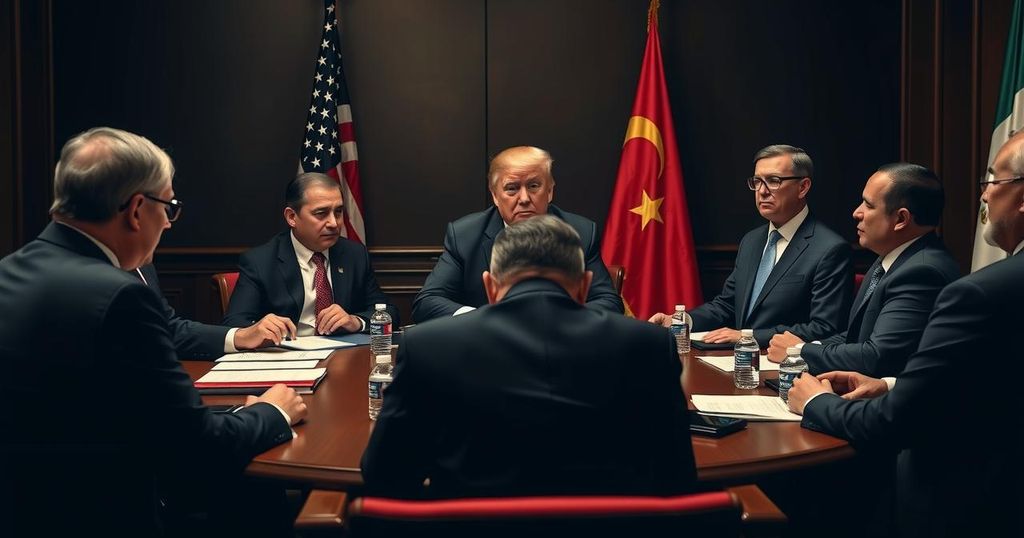Trump’s Proposed Tariffs on Canada, Mexico, and China: Implications and Reactions
President-elect Donald Trump plans to impose tariffs on Canada, Mexico, and China focused on combating illegal immigration and drug trafficking. His proposal includes a 25 percent tariff on goods from Canada and Mexico, and 10 percent on Chinese imports. The tariffs have prompted cautious responses from the affected countries, with implications for global markets and a potential shift in trade dynamics as Trump seeks to renegotiate trade agreements.
President-elect Donald Trump has signaled his intent to implement substantial tariffs on the United States’ primary trading partners—Canada, Mexico, and China—upon taking office on January 20. These proposed tariffs, articulated as a strategy to combat the influx of illegal drugs and undocumented migrants, include a 25 percent levy on imports from Mexico and Canada, alongside a 10 percent tariff on Chinese goods. Trump has linked these economic measures to issues of national security and drug trafficking, emphasizing that they will remain in place until these issues are adequately addressed.
Trump’s campaign rhetoric also included potential tariffs exceeding 60 percent on Chinese imports and up to 1,000 percent on Mexican vehicles, although it remains uncertain if the new tariffs will overlap with these previous proposals. The president-elect has underscored that tariffs would persist until both Canada and Mexico take stronger actions against illicit border activities and that China needs to halt the flow of fentanyl into the U.S.
The reactions from Canada and Mexico are cautious, with Canadian officials stressing the importance of cooperative trade relations, while Mexico has indicated a reciprocal response to any U.S. tariff imposition. China’s response was dismissive of a trade war, highlighting the mutually beneficial nature of their economic ties. The proposed tariffs have already influenced currency valuations, with the Canadian dollar and Mexican peso experiencing declines against the U.S. dollar as market uncertainties increase.
Global market response has included a downturn in major stock indices, suggesting that the imposition of tariffs may lead to inflationary pressures in the U.S., complicating monetary policy for the Federal Reserve. Analysts believe these tariffs might serve as leverage for Trump in renegotiations concerning the United States-Mexico-Canada Agreement (USMCA), indicating a shift back to trade policies reminiscent of his previous presidency. Critics argue that the tariffs could undermine free trade in North America while also impacting a broad range of goods beyond the drug trade, thus posing potential risks to economic stability.
The article examines President-elect Donald Trump’s proposed tariff policies aimed at the United States’ leading trading partners—Canada, Mexico, and China. These tariffs are presented as a mechanism to counteract drug trafficking and illegal immigration, aligning economic strategy with national security concerns. The historical context sets the stage for understanding Trump’s ongoing focus on trade deficits, especially regarding China, which has been a pivotal point during his initial administration. Additionally, the reactions from these countries inform the broader implications these tariffs might have on international commerce and diplomatic relations, reflecting past experiences under Trump’s previous tenure.
In conclusion, President-elect Trump’s intentions to impose significant tariffs on Canada, Mexico, and China reflect his administration’s continued focus on addressing trade imbalances linked to national security issues. These planned tariffs may escalate trade tensions and alter the dynamics of international relations within North America, while also potentially triggering economic repercussions such as inflation and market instability. The reactions from the affected parties underscore the complexities of navigating trade negotiations amidst such robust economic measures, which could reshape bilateral agreements like the USMCA.
Original Source: www.aljazeera.com




Post Comment